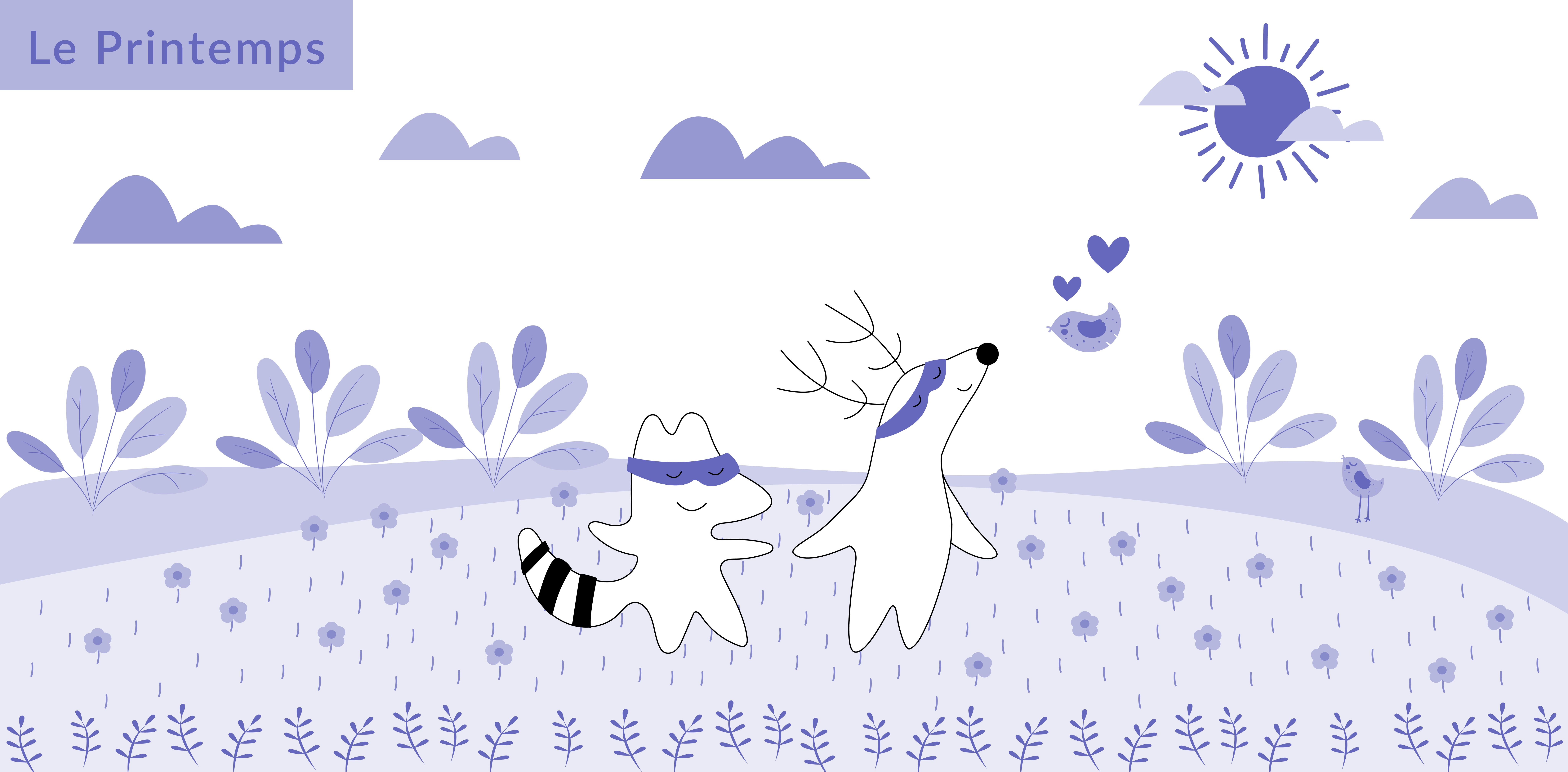
The four seasons in French — le printemps (spring), l'été (summer), l'automne (autumn), and l'hiver (winter) — form a rhythmic backdrop to French life, influencing everything from cuisine to celebrations, fashion, and even idiomatic expressions.
Understanding how all seasons of the year are interlaced with the French language and culture not only broadens your vocabulary but deepens your cultural awareness.
Uncover the linguistic treasures of each saison, learn about French seasonal holidays, discover what constitutes each season in France, and soak in French phrases that beautifully encapsulate seasonal activities and trends.
Learn French with Langster
Le Printemps — “Spring” in French
Le printemps in France typically spans from March to May, with the arrival of warmer weather and longer days. The word printemps itself comes from the Latin primo tempore, meaning "the first time."
During this season, flowers bloom, birds sing, the temperature gets milder, outdoor activities return, and new life emerges after the cold winter months.
Spring Vocabulary List
Here are some vocabulary words related to le printemps:
French
English
le printemps
spring
au printemps
in spring
chaud
warm
les fleurs
flowers
l'abeille
bee
l'herbe
grass
la pluie
rain
le papillon
butterfly
jardinage
gardening
le beau temps
good weather
Some French phrases related to spring are:
| French Saying | Translation | Explanation |
|---|---|---|
| En avril, ne te découvre pas d'un fil. | In April, don't take off a thread. | This proverb reminds us not to get too excited about the warmer temperatures in April, as there can still be unpredictable weather. |
| Faire le point. | To make the bridge. | This phrase refers to taking an extra day off work between a holiday and the weekend, essentially creating a "bridge" of consecutive days off. |
| French Saying | Translation | Explanation |
|---|---|---|
| En avril, ne te découvre pas d'un fil. | In April, don't take off a thread. | This proverb reminds us not to get too excited about the warmer temperatures in April, as there can still be unpredictable weather. |
| Faire le point. | To make the bridge. | This phrase refers to taking an extra day off work between a holiday and the weekend, essentially creating a "bridge" of consecutive days off. |
Cultural Insights
In France, spring is also associated with Pâques (Easter), a major religious holiday that commemorates the resurrection of Jesus Christ. Children go on egg hunts, and families gather for a traditional Easter meal, typically consisting of lamb and chocolate treats — oeufs en chocolate.
Some other spring holidays include:
French
English
Le 1er mai, la Fête du travail
Labor Day
Le 1er avril, Poisson d’avril
April Fools
l’Ascension
Ascension Day
Other popular activities during this season include picnics, visiting parks and gardens, and enjoying outdoor concerts.
L'Été — “Summer” in French
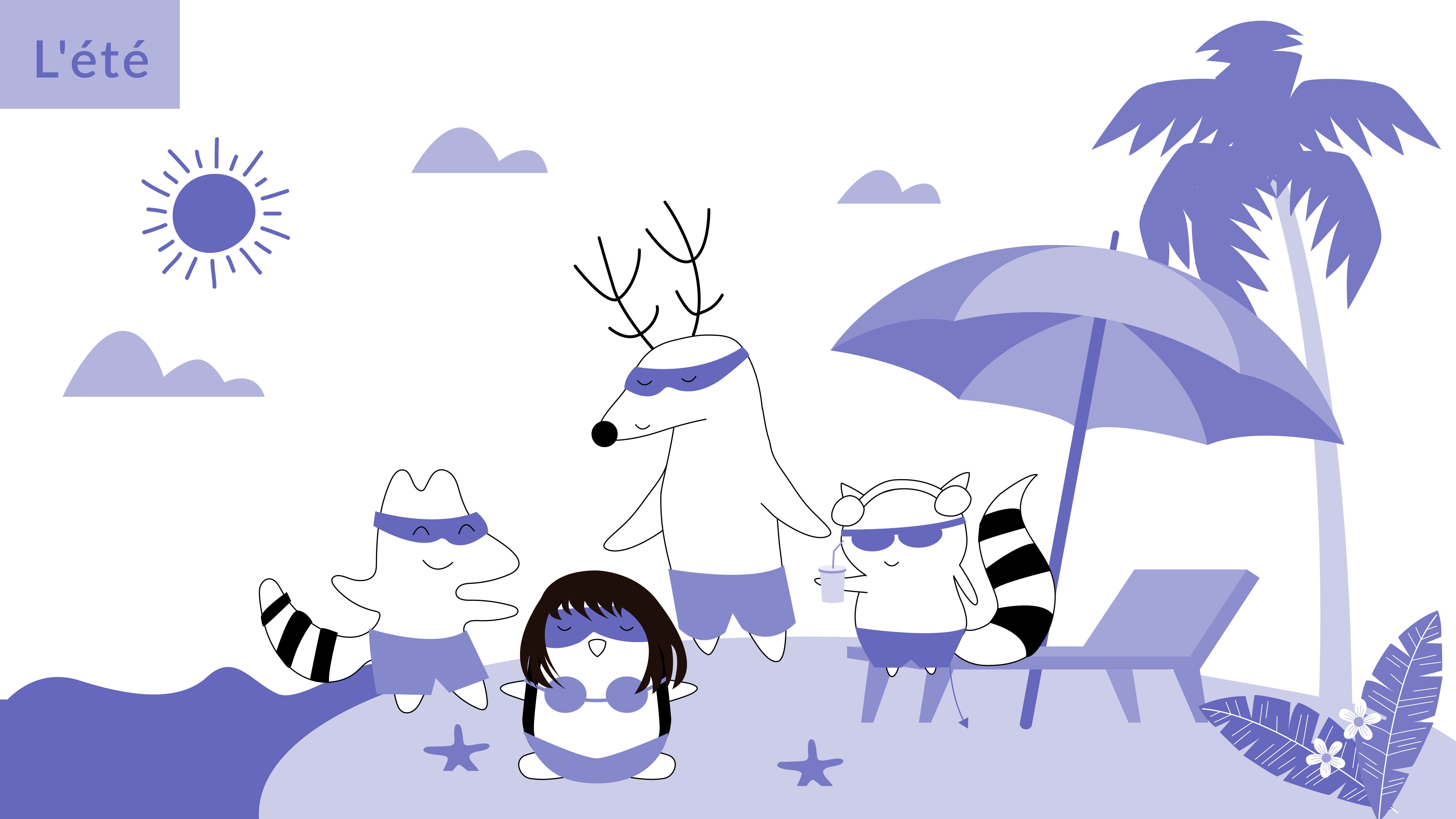
L'été in France spans from June to August, with hot temperatures and abundant sunshine. The word été comes from the Latin aestas, meaning "heat."
This season is known for its warm weather, longer days, and vibrant energy.
Summer Vocabulary List
Here are some vocabulary words related to l'été:
French
English
l'été
summer
en été
in summer
la plage
beach
le soleil
sun
la crème solaire
sunscreen
les lunettes de soleil
sunglasses
la glace
ice cream
les vacances
vacation, holiday
la chaleur
heat
Some French phrases related to summer are:
| French Expression | Translation | Explanation |
|---|---|---|
| C'est la canicule. | It's a heatwave. | This phrase is used to describe extremely hot weather. |
| Prendre la mer. | To take to the sea. | This phrase describes going on a seaside vacation, as many French people do during the summer months. |
| French Expression | Translation | Explanation |
|---|---|---|
| C'est la canicule. | It's a heatwave. | This phrase is used to describe extremely hot weather. |
| Prendre la mer. | To take to the sea. | This phrase describes going on a seaside vacation, as many French people do during the summer months. |
Cultural Insights
With its long days and sunny skies, summer is arguably France's favorite season. From June to September, the country comes alive with outdoor activities such as picnics, swimming, and pétanque — a popular French game similar to bocce ball.
In France, summer is also the ideal time for traveling and taking les vacances with family and friends. The country's coastline during la saison touristique becomes bustling with tourists enjoying the sun, sand, and sea.
Another popular activity during this season is attending music festivals like le Festival d'Avignon, which showcases a variety of performing arts.
The month of July also brings La Fête Nationale (Bastille Day) on July 14th, a national holiday commemorating the storming of the Bastille prison during the French Revolution. Fireworks displays and parades are common celebrations.
L'Automne — “Autumn” in French
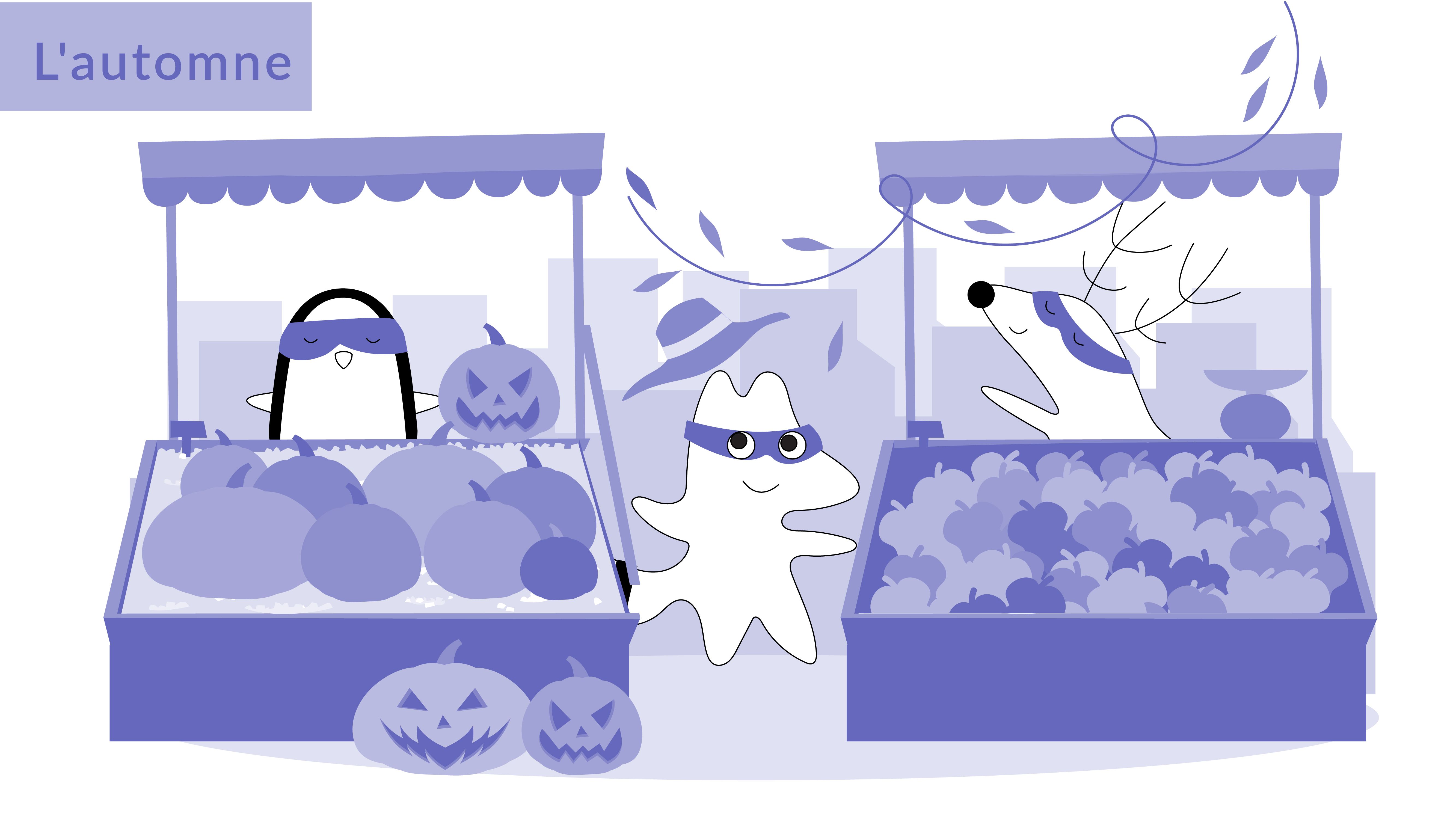
L'automne in France spans from September to November, with cooler temperatures and the changing of leaves. The word automne comes from the Latin autumnus, meaning "to harvest."
This season is known for its crisp air, pumpkin-spiced everything, and cozy atmosphere from the point of view of countries in the Northern Hemisphere. During these months, farmers gather their crops and prepare for the winter season.
Autumn Vocabulary List
Here are some vocabulary words related to l'automne:
French
English
l'automne
autumn
en automne
in autumn
les feuilles
leaves
le vent
wind
le raisin
grapes
la châtaigne
chestnut
les champignons
mushrooms
le frais
cool
la citrouille
pumpkin
la rentrée
backtoschool season
Some French phrases related to autumn are:
| French Expression | Translation | Explanation |
|---|---|---|
| Été de la Saint Martin. | St. Martin's summer, also known as an Indian summer. | This phrase describes that part of September when days still remain quite warm. |
| La feuille d'impôts. | The tax bill. | This phrase refers to the arrival of tax bills in the mail during autumn, a necessary but often dreaded event for French citizens. |
| French Expression | Translation | Explanation |
|---|---|---|
| Été de la Saint Martin. | St. Martin's summer, also known as an Indian summer. | This phrase describes that part of September when days still remain quite warm. |
| La feuille d'impôts. | The tax bill. | This phrase refers to the arrival of tax bills in the mail during autumn, a necessary but often dreaded event for French citizens. |
Cultural Insights
As the leaves start to change colors, and the temperatures begin to drop, autumn brings a certain coziness to France. From September to December, it is common to see French people enjoying hearty meals and taking leisurely strolls through parks and forests, getting the most out of this beautiful season.
In France, l'automne is also associated with Halloween on October 31st, a holiday that has gained popularity in recent years and is followed by All Saints Day on November 1st. Traditional celebrations include costume parties and trick-or-treating.
One of the most iconic holidays celebrated during fall in France is la Fête des Vendanges, or the Harvest Festival. It's a time to celebrate the end of the grape harvest season and sample delicious wines from different regions.
La rentrée is also a significant event during this season, when children go back to school and adults return to work after summer vacations.
L'Hiver — “Winter” in French
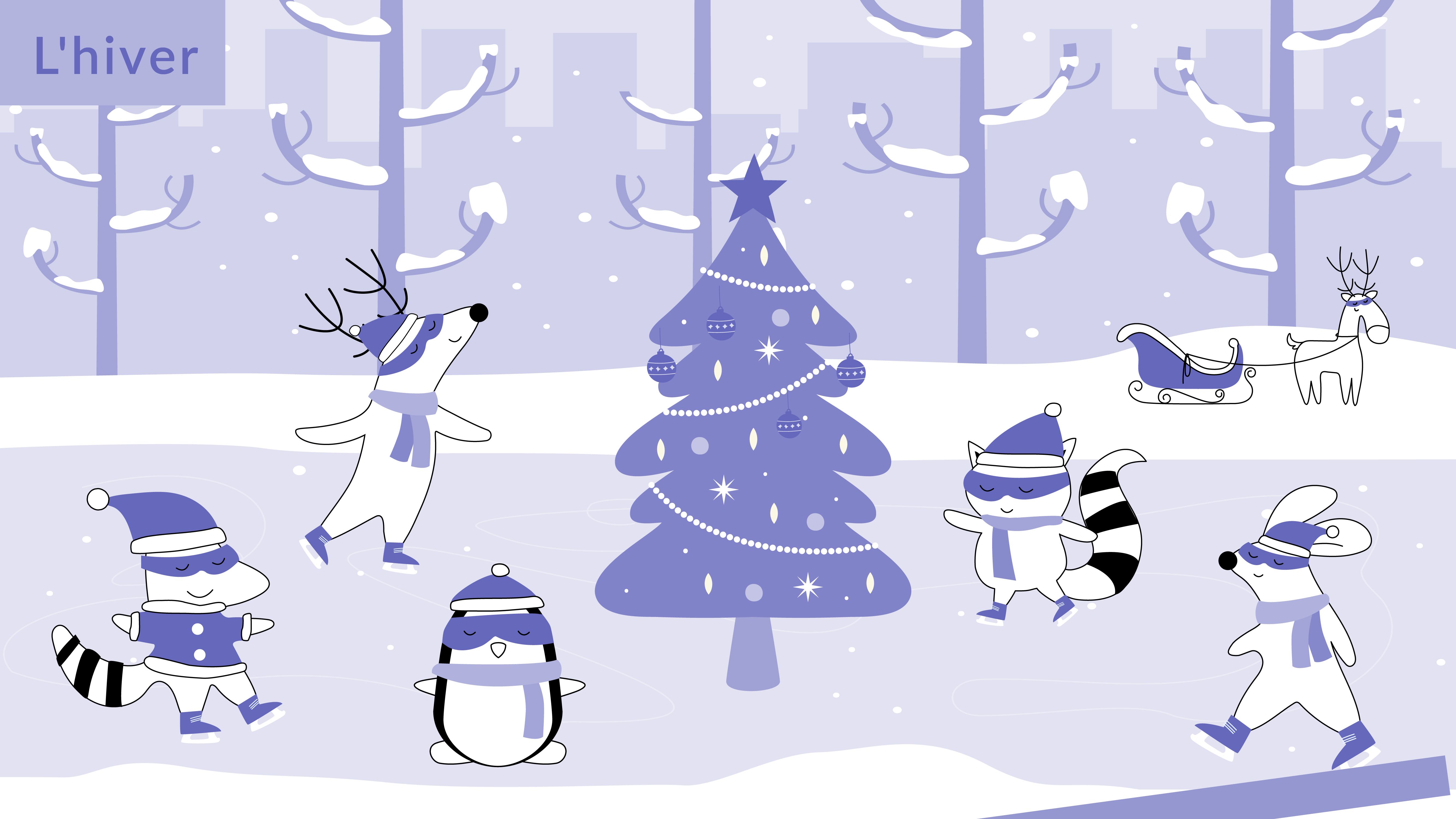
L'hiver in France spans from December to February, with the coldest temperatures and shorter days. The word hiver comes from the Latin hibernus, meaning "wintry."
This season is characterized by cold weather, shorter days, and the occasional snowfall. Winter is a time for cozying up by the fireplace, enjoying hearty meals, and celebrating the holiday season.
Here are some vocabulary words related to l'hiver:
French
English
l'hiver
winter
en hiver
in winter
la neige
snow
le feu de cheminée
fireplace
le chocolat chaud
hot chocolate
les vacances d'hiver
winter holidays
les cadeaux de Noël
Christmas gifts
le froid
cold
la gelée
frost
Some French phrases related to winter are:
| French Saying | Translation | Explanation |
|---|---|---|
| Chaud comme la braise. | Hot as embers. | This phrase is used to describe something very hot, often referring to a cozy fireplace during cold winter nights. |
| La galette des rois. | The king cake. | This phrase refers to a traditional French pastry eaten during the month of January to celebrate Epiphany, where a small figurine is hidden inside, and the person who finds it is crowned as king or queen for the day. |
| French Saying | Translation | Explanation |
|---|---|---|
| Chaud comme la braise. | Hot as embers. | This phrase is used to describe something very hot, often referring to a cozy fireplace during cold winter nights. |
| La galette des rois. | The king cake. | This phrase refers to a traditional French pastry eaten during the month of January to celebrate Epiphany, where a small figurine is hidden inside, and the person who finds it is crowned as king or queen for the day. |
Cultural Insights
In France, l'hiver is also associated with Christmas and New Year's Eve, both widely celebrated holidays, so it is common to hear Joyeux Noël (Merry Christmas) and Bonne Année (Happy New Year) being exchanged between French speakers.
Families gather to exchange gifts, enjoy traditional meals like la bûche de Noël (yule log cake), and attend midnight mass. Winter is also the perfect time for outdoor activities like skiing in the French Alps or cozying up by a feu de cheminée with a hot cup of cocoa.
The month of January is also known as the soldes, where many stores offer discounted prices.
Season-Related Vocabulary
As you may have noticed, the word “season” can be used in many different contexts and French expressions. Below, we provide a list of the most common season-related words and phrases:
French
English
les quatre saisons
four seasons
la saison sèche
the dry season
la saison des pluies
the rainy season
la saison de la récolte
the harvest season
la saison touristique
the tourist season
les vêtements de saison
the seasonal clothes
la saison des soldes
the sales season
la saison d'une série
the season of a TV series
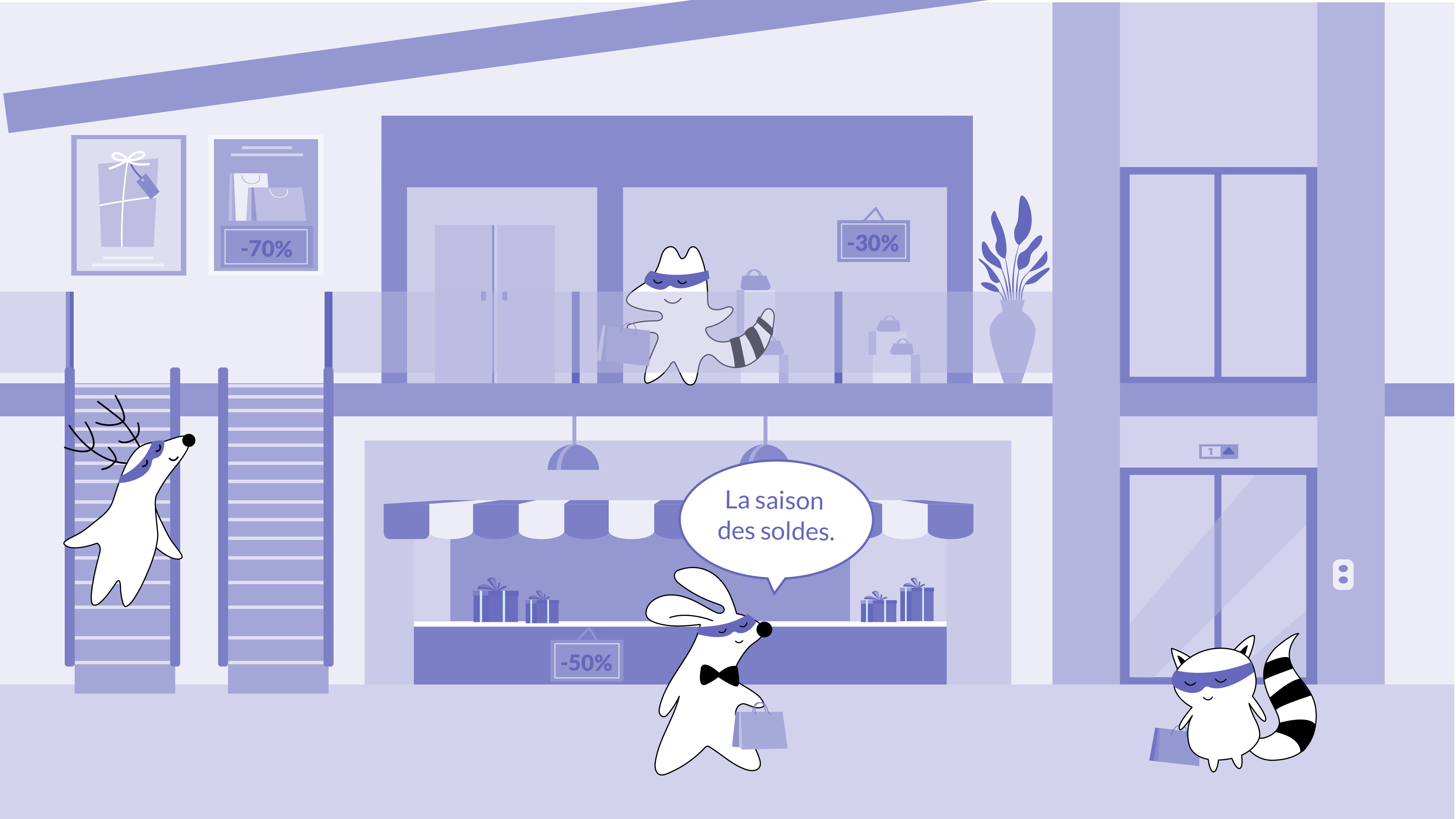
The Bottom Line
The four seasons in French not only represent changes in weather but also hold significant cultural and linguistic significance in France. From Easter celebrations to grape harvest festivals, there's always something special happening in France during every saison.
By learning about the vocabulary, holidays, and phrases associated with each season, you will not only expand your language skills but gain a deeper understanding and appreciation for French culture.
So, next time you find yourself speaking French with a native speaker, don't forget to bring up the current season and all its delights. Download our Langster app to find more examples of using this seasonal vocabulary in real-life contexts, and fully immerse yourself in the French experience. Happy learning!
Learn French with Langster









